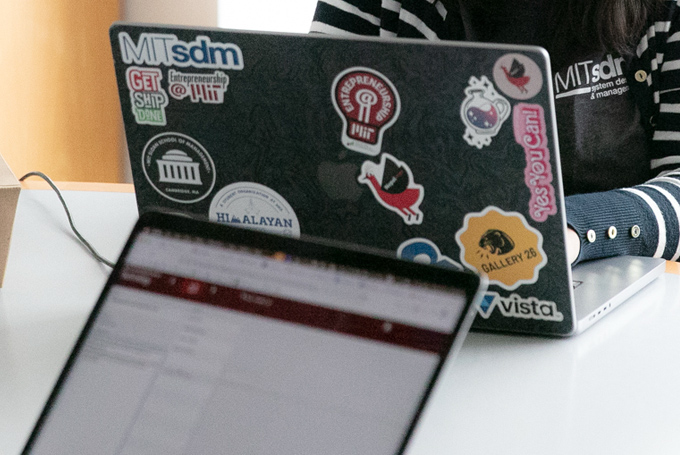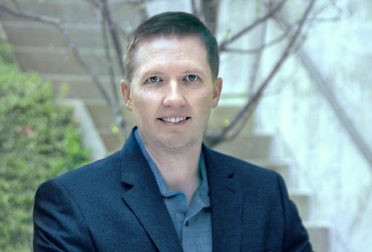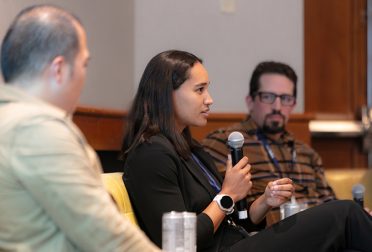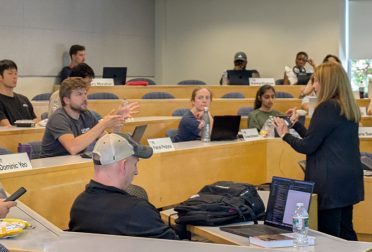by Stefanie Koperniak
Three SDM fellows have had the opportunity to use and expand upon what they have been learning in SDM as part of the Social and Ethical Responsibilities of Computing (SERC), within the MIT Schwarzman College of Computing. Dave Kmiec, Emily Lauber, and Luc Dao were selected as part of the 2024-2025 cohort of SERC Scholars, students who collaborate in multidisciplinary teams to conduct research into important challenges shaping the digital world. SERC scholars explore issues such as deepfakes, ethical surveillance and privacy protection, the societal impact of gamification, and data ownership in the age of artificial intelligence.
Kmiec arrived at SDM with a background fusing science and communications, including a BA in chemistry and English, an MS in technical communications, and a PhD in rhetoric and scientific and technical communication. He sees communication as essential to engineering and often works at the intersection of humanities and computer science.
“I’m interested in how people in technical professions persuade each other of things, including how people with completely different types of expertise can convince each other of anything,” says Kmiec. “This involves looking at what counts as evidence and who determines this.”
Kmiec is particularly interested in gamification—implementing incentives and motivations to encourage certain activities and outcomes—and how this can change social environments. His SERC project brings gamification together with his other key interest of engineering management, looking specifically at labor games.
Labor games, such as can be found at a Target checkout, are systems providing immediate feedback to workers on their performance (such as with colored lights or other features). They can be used to help incentivize speed and efficiency.
“While managers in the 20th century might have managed primarily through paperwork and oral communications, digitization has changed things substantially,” says Kmiec. “At the same time, the complexity of organizations has increased, and AI has altered some of the work that people do and the attention it entails. Gamification can be a ‘spoonful of sugar approach,’ giving a worker a game to play while doing a job, not managing or assessing performance as much through reports or charts, but presenting something that makes the person want to play along.”
His project looks at the gamification of labor, such as UPC scanning, with a wider systems approach—looking at the interaction of all involved and the ethical context of how the games are deployed.
Emily Lauber is also working on a SERC project related to gamification, but in the context of web standards. Lauber, who has an undergrad degree in civil engineering, is a senior product manager focusing on identity for Microsoft. She says that when she decided to pursue a master’s degree, she didn’t want to pursue an MBA or a program that focused singularly on a specific type of engineering—and, ultimately, SDM was “an exact fit.”
“I am especially drawn to looking across different engineering systems from a higher level, particularly the ‘people systems’ side,” says Lauber.
Lauber’s SDM thesis focuses on a systems analysis of web standards and web standard bodies. She says that her thesis was inspired by 16.855J/EM.429/IDS.336 (Systems Architecting Applied to Enterprises), taught by Dr. Donna H. Rhodes of the Sociotechnical Systems Research Center, who also serves as Lauber’s thesis advisor.
The deeply technical and human challenges of web standards are also the focus of Lauber’s SERC research. Her project focuses on understanding the potential gamification of web standards, including how this impacts users, what the rules of the game might be, and whether individuals or institutions can “cheat” at the game.
“We aim for a single interoperable web, but once you create and specify web standards, a company may or may not adopt them. Contributors to the creation of the standards may all collectively agree, but there is no ‘forcing function’ to ensure that the standards will be implemented,” says Lauber. “We are looking at the larger implications of gamifying web standards. Anything that can be measured can be gamed.”
Lauber says that her collaborative, interdisciplinary SERC research has given her an opportunity to connect with students from a variety of different areas throughout the Institute who have provided her with other elements to consider in her research. She says SERC Scholar presentations have been especially interesting, including one focusing on the impact of technology development on democracy, and have helped shape her own approaches to engineering problem-solving.
Luc Dao was an engineering manager at Goldman Sachs and says he decided to pursue the SDM program “to step out of my comfort zone.” He was particularly interested in learning more about AI systems.
His SDM studies in stakeholder management, systems thinking, and complexity analysis overlap with his SERC research, which looks specifically at data ownership, privacy, and implications for AI. This work weaves in a lot of philosophy and ethical considerations.
“Thinking about ownership of a tangible thing, like land, is foundational to thinking about data ownership,” says Dao.
With AI now being trained and modeled upon so much content—and being so widely available and used—it can be unclear as to what is fair use of the resources and what ownership means in this context.
Dao’s main SERC project considers how to design a framework to better understand the ethical and legal implications of data ownership in the context of AI. He is also working on a smaller project that looks specifically at accountability.
“If AI causes harm to society, can’t hold AI accountable—we should be accountable,” says Dao.
Dao’s work uses a systems approach infused with the understanding of the possible negative impact when just one agent within a system doesn’t behave correctly—potentially damaging the entire system—and aims to design a system to be more resilient against a bad actor.
“SDM provides us with very helpful tools for systems thinking and designing frameworks for a variety of purposes,” says Dao. “By viewing systems at different levels of complexity, we can aim to tackle not only the technical challenges of the engineering systems, but also the ethical aspects.”




